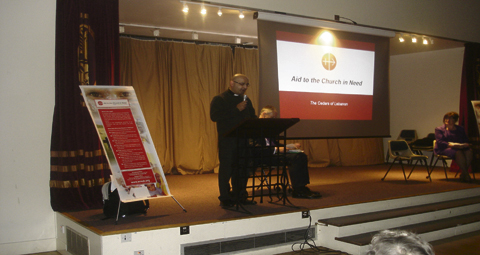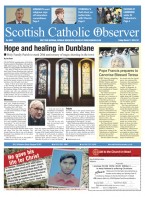September 28 | ![]() 1 COMMENT
1 COMMENT ![]() print
print

From the cradle of Christianity to Catholics here in Scotland
Hearing Lebanese Marionite Fr Samer Nassif speak at the ACN event in Paisley on the vital role Christians play in the path to peace in Lebanon and the Middle East was moving and informative, especially with a lack of reporting from the region after the recent Papal visit to Lebanon.
Fr Nassif’s joy in celebrating the Mass, his humour when people assume he is a convert to Christianity when the Marionite rite is as old as Christianity itself, his praying the Our Father in Aramaic and singing Ave Maria in Arabic vividly bring home that the Middle East is the cradle of Christianity and that, as Pope Benedict XVI said, religious freedom there is vital if peace is to be achieved and maintained during and after the Arab Spring.
The SCO’s impressions of the event pale in comparison to those of Gus Khawli, the Lebanese father of a Scottish family based in Dumbarton, who attended the ACN Mass and discussion event with his family. He shared his impressions with the newspaper this week.
“I have been married to Dorothy Anne McCormack—Khawli for 28 years and I always had the opportunity to browse through your Scottish Catholic Observer as my dear mother in law, May McCormack, had an annual membership,” he said. “The reason I used to browse through the various issues was to try and find any piece of information about Christians in the Middle East.
“My dear late mother-in-law had many opportunities to visit Lebanon and one of her statements about the country was the feeling of closeness to God and Our Lady when walking in the streets. The Lebanese people have a very strong connection to Our Lady and most homes and small shops have a statute in their premises inside or out.
“There are also a number of statues on street corners, roundabouts and places of attraction. Lebanon also has a great number of convents and monasteries which we loved to visit with my mother-in-law especially St Charbel and Harrissa (Our Lady of Lebanon).
“So you could imagine how happy I was to hear about the Mass and ACN presentation with Fr Nassif and the other presenters which was excellent in terms of the details provided about Christians in the Middle East in general and Lebanon in particular.
“I strongly believe that the time was limited and a lot more information can be provided. A very important issue today is that we have a number of Arab Christians here in Scotland that need direction and welcoming arms from the local Catholic Church to meet and attend Mass.
“I hope the Scottish Catholic Observer, ACN and Christians from the region such as myself can open the eyes of British Catholics to help and create some sort of pilgrimage to the Holy Land of Lebanon.”












It was very interesting for me to read the above article about the birth place of Christianity. I do appreciate my dear friend’s call for visits to the Holy Land but more to the point, I call for visits to the troubled “living stones” of the land namely, its Christian inhabitants.
I believe that the Christians of the Middle East are living evidence about the living history of Christianity. They are a “living museum” today which confirms that it all started there… these “living stones” should be preserved as they are witnesses who became Chrisitians becasue their great granparents were there 2000 years when it all happened. They are a significant cultural and religious heritage for the whole world.
The Christians of the Middle East should be preserved by UNESCO. UNESCO perserves cultural treasures and the “living stones” are human cultural treasures that are more important than buildings and sites.
A visit to the port city of Tyre where Jesus healed the son of the widow or to the monument of “The Lady of Waiting” on the way to Sidon where the Virgin Mary waited for Jesus while he was in Sidon will definitely make the reader read the Bible in context. Seeing the olive groves and vineyards in the Holy Land will only help the reader of the Bible to visualise its parables.However; an informal chat with a “living stone” (Christian from the Middle East) will multiply that experience by a million and will open eyes to the ancient living traditions of an early Christian culture which survives today without being very aware of itself and its value. The values of Middle Eastern Christian societies are the same ones of early Christianity. These same values are passed from one generation to another.